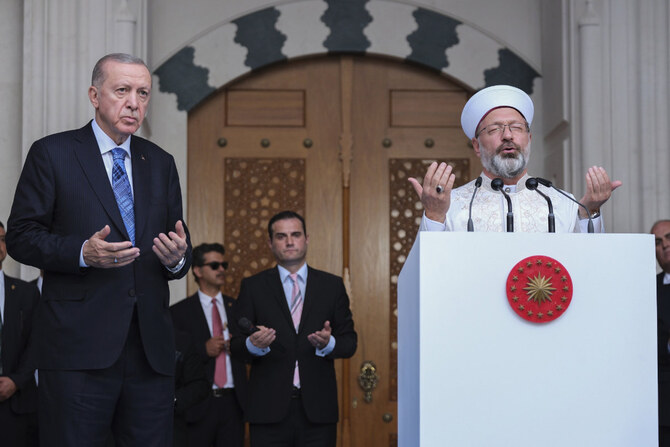TIRANA, Albania: Turkiye’s President Recep Tayyip Erdogan traveled Thursday to Albania’s capital to inaugurate a Turkish-funded mosque with 50-meter-high minarets as part of a trip to boost ties and discuss regional issues.
Erdogan also said that his country would give an unspecified number of drones to boost military capabilities in Albania, whose population is slightly more than 50 percent Muslim.
The new Namazgah mosque in Tirana is one of the largest in the Balkans.
Erdogan met with Albanian President Bajram Begaj and later with Prime Minister Edi Rama, with whom he has close ties. Following a meeting of top officials from both countries, the two sides signed agreements to boost cooperation in agriculture and education.

A view of The Great Mosque of Tirana or Namazgah Mosque, the largest mosque in the Balkans, on the day of its inauguration on October 10, 2024. (REUTERS)
Turkiye is a strategic partner of Albania and one of its largest investors, contributing to infrastructure and other sectors. Erdogan said the two countries should aim to double their annual trade to 2 billion euros ($2.2 billion).
Some 600 Turkish companies employ more than 15,000 people in Albania, Erodgan said in February when he hosted Albanian Prime Minister Edi Rama.
It is one of the five biggest foreign investors in the country, he said, with $3.5 billion (3.2 billion euros) committed there.
Construction of the new mosque was started in 2015 with some 30 million euros ($34 million) from the state-run Turkish Muslim organization Diyanet.
The construction already had been completed for more than a year, but the inauguration was delayed because of Erdogan’s concerns that a group that Turkiye calls the Fetullah Terrorist Organization, or FETO, would have influence over the mosque.
Under agreements reached with the local Albanian Muslim community, Turkiye’s Diyanet organization will have representation on the mosque’s governing board.
Turkiye says that FETO and its US-based leader Fetullah Gulen orchestrated a failed coup in Turkiye on July 15, 2016, which left 251 people dead and nearly 2,200 wounded. Gulen has denied any involvement.
In addition to the four minarets, the Namazgah mosque has a central dome of 30 meters and the capacity to hold 8,000 people. It sits on a 10,000-square-meter parcel of land near Albania’s parliament, and the first floor includes a cultural center.
The site is near landmark Catholic and Orthodox cathedrals.
Sunni Muslims make up nearly 46 percent of Albania’s population, and Bektashi Muslims another 5 percent. Catholics are 8 percent and Orthodox Christians 7 percent, according to a 2023 census. The various religious groups live together peacefully without tensions.

Turkish President Tayyip Erdogan, his wife Emine Erdogan and Albania's Prime Minister Edi Rama cut the ribbon, during the inauguration of the Namazgah Mosque in Tirana on October 10, 2024. (REUTERS)
Kamikaze drones
At a briefing after the meetings, Rama said Turkiye’s gift of military drones sends a “very clear message” that “Albania cannot be attacked.”
“It is a present that comes as a strong message from the Republic of Turkiye that Albania is unhittable,” Rama told a joint news conference during on one-day visit by Erdogan.
The so-called kamikaze drone is a loitering munition that cruises toward its target before plummeting at velocity and detonating on impact.
Rama also said that the acquisition of an unspecified number of Turkish kamikaze drones does not mean “Albania will attack anyone.”
Most countries in the Western Balkans, including Albania, have started to upgrade their aging militaries after Russia invaded Ukraine in 2022.
Albania and Turkiye are both members of NATO. The government in Tirana has already acquired a fleet of Turkish-made Bayraktar reconnaissance and attack drones.
Trip to Serbia
On Friday, Erdogan will move on to Serbia, where Turkiye made a major diplomatic comeback in 2017 with a landmark visit to Belgrade.
The trip helped Erdogan and his Serbian counterpart Aleksandar Vucic mend ties between the countries.
The five centuries of the Ottoman presence in Serbia have traditionally weighed heavily on relations between Belgrade and Ankara.
Another source of tension has been Turkiye’s cultural and historic ties with Serbia’s former breakaway province of Kosovo. Kosovo declared independence in 2008, a move Belgrade still refuses to recognize.
But Erdogan’s 2017 visit repaired Turkiye’s relationship with Serbia, Belgrade-based analyst Vuk Vuksanovic told AFP.
Since then “the Balkans is quite a success story for Turkiye,” he added.
Even so, it has not been all plain sailing with Belgrade furious last year when Turkiye sold drones to Kosovo, something Serbia said was “unacceptable.”
But the row could be patched up, the analyst insisted.
“I would not be surprised if we see a military deal at the end of this visit,” Vuksanovic said.
He expected the talks in Belgrade to focus on “military cooperation, the position of Turkish companies, and attempts by Belgrade to persuade Ankara to tone down support for Kosovo.”
Even though the rapprochement is relatively recent, economic ties between the two countries are already significant.
Turkish investment in Serbia has rocketed from $1 million to $400 million over the past decade, the Turkiye-Serbia business council told Turkiye’s Anadolu news agency.
Turkish exports to Serbia hit $2.13 billion in 2022, up from $1.14 billion in 2020, according to official Serbian figures.
Turkish tourists are also hugely important for Serbia, second only in visitor numbers to those from Bosnia.





























